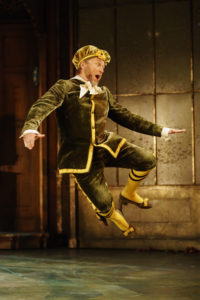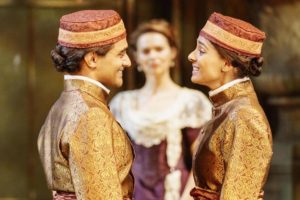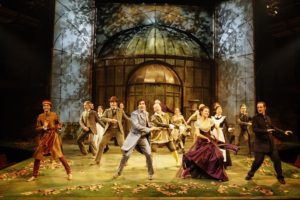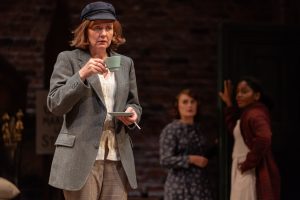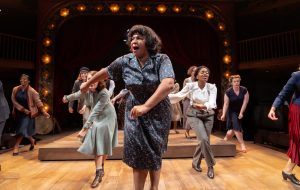Stratford production lets Shakespeare speak for himself
★★★★
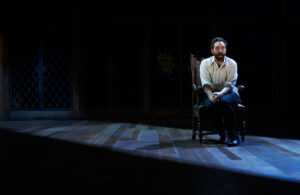
The COVID-cancelled Royal Shakespeare Company production of The Winter’s Tale has returned as a play for TV, as part of BBC4’s Lights Up season of ‘lost’ plays.
It is set in, or at least starts in, the 1950s. We find ourselves in the court of the King of Sicily, Leontes. Within minutes the loving relationship between ruler and his queen Hermione is in tatters as Leontes succumbs to jealousy and the belief that his lifelong best friend Polixenes, the King of Bohemia, is having an affair with Hermione.
On the page, it seems hard to accept how easily this happens but William Shakespeare is the king of dramatists and the spoken word carries you along. The words in this play may not quite match those in the greatest Shakespeare plays, say Hamlet, but, tumbling out of mouths on stage, they provide image after image of the human condition and with a speed and style always matching the characters. The result, despite the implausibility of the plot at many points, is deep, believable characters caught up in a gripping drama.
Shakespeare wrote The Winter’s Tale not as a book or a movie but as a play. So, thank goodness, the director Erica Whyman has confidence that Shakespeare knows what he’s doing. It is filmed as a stage play. Bridget Caldwell’s film direction is kept simple and that’s to its credit. There are close-ups of course but otherwise we’re left to see the actors on the large Swan Theatre stage, which itself is sparsely decorated by set designer Tom Piper. Any music, which is provided by the eclectic Isobel Waller-Bridge, is occasional and enhances rather than intrudes.
Although The Winter’s Tale is technically a comedy, the first half is pretty much a tragedy. Leontes presumes his new baby is by Polixenes and condemns it to death. He puts his wife on trial with disastrous consequences. In fact, the deaths and apparent deaths bring home to Leontes how wrong he has been. And don’t forget this is the play with the most famous stage direction in theatrical history- ‘exit pursued by a bear’. I can tell you that bear isn’t after a cuddle.
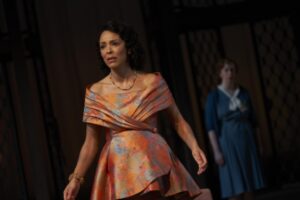
Some excellent actors to convey the script. Joseph Kloska plays Leontes as quite ordinary, somewhat pathetic. Even when he’s at his worst, he seems more mentally unstable than tyrannical which, I think, helps offset the tragic nature of this comedy. Kemi-Bo Jacobs as Hermione conveys her lines with regal authority and dignified passion. Ben Caplan playing Leontes’ right hand man Camillo makes every careful syllable suggest the conflict between loyalty and conscience. Amanda Hadingue as Hermione’s broken-hearted companion Paulina touches us with her uncontrolled anger.
So the first half, which is about 90 minutes and takes us to the end of act 3, is very dark.
And having set up the tragedy, Shakespeare changes the tone. It’s 16 years later, a time gap which itself is unusual for Shakespeare. To some extent, this is a play about the healing power of time. Leontes has been grieving and repenting all this time.
We begin the second half, now in the mid 1960s, with some rock’n’roll. It becomes much more like the Shakespearean comedies we are familiar with. There are people disguising their origins, there’s forbidden love, there’s a mischief-making rascal Autolycus played with a cheeky chappy style by Anne Odeke. All’s well that ends well, except for the ones that died.
There’s a romantic, pastoral theme to the second half, including young lovers, shepherds and a sheep shearing festival. This makes the sixties setting very appropriate, it being a time when pop culture embraced romanticism and nature. In fact, the concept of contrasting the austere fifties with the free sixties is an inspired way of representing the two halves of The Winter’s Tale. The beautiful costumes by Madeleine Girling are elegant in the first half, more flamboyant in the second.
So, it’s a bittersweet ending, a story of redemption, forgiveness and reconciliation, which doesn’t deny the ill that has gone before. It is clear that some things that have been lost will never be regained.
There are some nice touches in the production. To emphasise that Leontes is conducting a show trial of Hermione, we see it partly as being televised with early black-and-white TV cameras. And later on, a feast is shown being filmed on Super 8 or something kind of early home movie.
Those are really the only thing approaching a gimmick. Otherwise, it’s a joy to watch a production that allows actors to speak Shakespeare’s words at length and without distraction.
The Winter’s Tale was broadcast on BBC4 on 25 April and is available to watch on BBC iPlayer
Click here to watch this review on the YouTube channel One Minute Theatre Reviews

